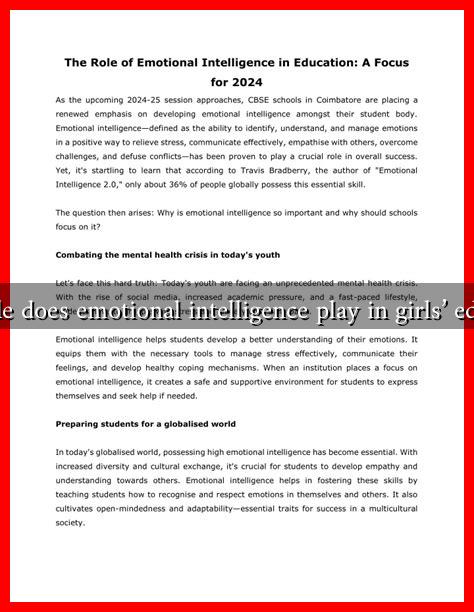-
Table of Contents
What Role Does Emotional Intelligence Play in Girls’ Education?
Emotional intelligence (EI) refers to the ability to recognize, understand, and manage our own emotions while also being able to recognize, understand, and influence the emotions of others. In the context of education, particularly for girls, emotional intelligence plays a crucial role in shaping their academic success, social interactions, and overall well-being. This article explores the significance of emotional intelligence in girls’ education, highlighting its impact on learning, relationships, and personal development.
The Importance of Emotional Intelligence in Education
Emotional intelligence is increasingly recognized as a vital component of effective education. Research indicates that students with high emotional intelligence tend to perform better academically and socially. For girls, who often face unique challenges in educational settings, developing emotional intelligence can be particularly beneficial. Here are some key reasons why EI is important in girls’ education:
- Enhanced Academic Performance: Studies show that students with higher emotional intelligence tend to achieve better grades. A study published in the Journal of Educational Psychology found that emotional intelligence significantly predicted academic success among adolescents.
- Improved Social Skills: Girls often navigate complex social dynamics in school. Emotional intelligence helps them develop empathy, communication skills, and conflict resolution abilities, which are essential for building healthy relationships.
- Increased Resilience: Emotional intelligence equips girls with the tools to cope with stress and adversity. This resilience is crucial in overcoming challenges, whether academic or personal.
Emotional Intelligence and Girls’ Unique Challenges
Girls face distinct challenges in educational environments, including societal pressures, bullying, and self-esteem issues. Emotional intelligence can serve as a protective factor against these challenges. For instance:
- Addressing Bullying: Girls are often targets of relational aggression, which can severely impact their mental health and academic performance. Emotional intelligence enables them to navigate these situations more effectively, fostering a supportive peer environment.
- Combating Stereotypes: Societal expectations can pressure girls to conform to certain behaviors. By developing emotional intelligence, they can better understand their emotions and assert their identities, leading to greater self-confidence.
- Promoting Collaboration: Girls often excel in collaborative settings. Emotional intelligence enhances their ability to work in teams, fostering a sense of belonging and community in educational settings.
Case Studies and Real-World Examples
Several educational programs have successfully integrated emotional intelligence training into their curricula, yielding positive results for girls. For example:
- The RULER Program: Developed by the Yale Center for Emotional Intelligence, this program teaches students emotional intelligence skills. Schools implementing RULER have reported improved academic performance and reduced behavioral issues among girls.
- Girls on the Run: This program combines physical activity with emotional and social learning. Participants develop self-confidence and emotional regulation skills, leading to improved academic outcomes and healthier relationships.
Statistics Highlighting the Impact of Emotional Intelligence
Numerous studies underscore the importance of emotional intelligence in education:
- A study by the Collaborative for Academic, Social, and Emotional Learning (CASEL) found that students who received social-emotional learning (SEL) instruction showed an 11% increase in academic performance.
- Research from the University of Illinois indicates that girls with high emotional intelligence are 30% more likely to engage in positive social behaviors.
Conclusion: The Path Forward
Emotional intelligence is a critical factor in girls’ education, influencing their academic success, social interactions, and personal development. By fostering emotional intelligence in educational settings, we can empower girls to navigate the complexities of their educational journeys more effectively. Schools, educators, and parents must prioritize emotional intelligence training to equip girls with the skills they need to thrive academically and socially. As we continue to recognize the importance of emotional intelligence, we pave the way for a more inclusive and supportive educational environment for all students.

